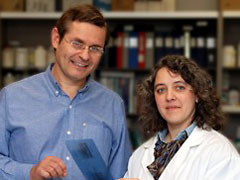Funding Promising Research
By Jim Oldfield
The Canadian Cancer Society (CCS) has awarded funding to six scientists from Sunnybrook Research Institute (SRI) for grants that sum to almost $3 million.
Drs. Rena Buckstein, Edward Chow, Jorge Filmus, Robert Kerbel, Katherine Mah and Shun Wong join three other SRI scientists already receiving funding from the CCS, which awards grants through the National Cancer Institute of Canada.
“This funding is a testament to the breadth and quality of cancer research at SRI,” says Michael Julius, vice-president of research at Sunnybrook. “We are grateful for the Canadian Cancer Society’s enduring support to research here. These awards build on that investment and allow six very promising initiatives to advance.”
Distributed as either three- or five-year grants, the funding will fuel a range of scientific investigations, including those into molecular and cellular biology, interventional clinical trials and quality of life.
Controlling tumour growth
Kerbel, a co-pioneer of metronomic chemotherapy—the low-dose, frequent administration of anti-cancer drugs over an extended period—is studying ways to make this therapy, which works by targeting blood vessel growth, or angiogenesis, more effective, for example, by combining it with targeted antiangiogenic drugs. Kerbel’s groundbreaking work in tumour angiogenesis has sparked clinical trials worldwide. Interim trial results show that the combination of metronomic chemotherapy and antiangiogenic drugs, like the newly approved Avastin, has a good response rate and is less toxic than conventional chemotherapy. Continuing foci for Kerbel’s team are figuring out optimal drug doses and reasons for drug resistance.
Limiting the side effects of another cancer treatment, radiation therapy, is the focus of Wong and Mah. Wong’s team was the first to describe a form of cell death that affects the brain and spinal cord in rodents shortly after radiation therapy. Further understanding of why radiation damages the central nervous system could lead to protection of it and the ability to administer higher radiation doses safely. Mah’s group will test if a new imaging technique for head and neck cancers allows doctors to see more clearly the exact location of a tumour’s edge, thereby enabling more accurate radiation therapy that spares surrounding healthy tissue.
New treatment for T cell lymphomas
In a multicentre phase I/II clinical trial, Buckstein’s group will test the optimal dose and efficacy of an antibody which, in combination with standard chemotherapy, may improve responses in patients with T cell lymphomas. T cells are a critical part of the immune system; this particular antibody binds to T cells, but it also suppresses immunity, so knowledge of a safe yet effective threshold is crucial. T cell lymphomas comprise only 15% of all lymphomas but, while rare, are the toughest to treat. The average patient lives for only 22 months after diagnosis. “It’s a kind of orphan lymphoma begging for some research to be done on it,” says Buckstein.
Hepatocellular carcinoma, or primary liver cancer, is also hard to treat but for a different reason: it often grows silently until it’s incurable. Filmus and his lab have identified a protein, glypican-3, that is present in the blood of people with primary liver cancer and which, when tested for along with another protein, boosts the detection rate of this cancer from 50% to 82%. Filmus’s group will apply this new test to a larger group of patients.
Many patients with advanced cancer are at risk for bone metastasis. Chow’s team is creating a new questionnaire that will measure quality of life, symptoms, side effects and other issues specific to patients with bone metastasis.
Based on current incidence rates, 2,865 Canadians per week will be diagnosed with cancer in 2005. On average each week, there will be 1,337 cancer deaths.
PDF / View full media release »




